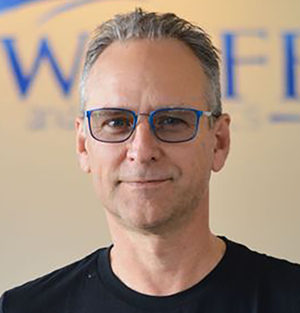Chris Casteel: ‘If you want to salsa dance, you have to put the work in’
By Theresa Flaherty, Managing Editor
Updated 11:14 AM CDT, Fri August 2, 2024
 DETROIT – Certificant of the Year Chris Casteel, a former machinist and plant manager, “jumped naively” into his career as an O&P professional, but in the two decades since, he’s used his experience, as both an amputee and a health care professional, to help others.
DETROIT – Certificant of the Year Chris Casteel, a former machinist and plant manager, “jumped naively” into his career as an O&P professional, but in the two decades since, he’s used his experience, as both an amputee and a health care professional, to help others.
“I had gotten laid off, so I thought, ‘Ok, let’s make people parts instead of car parts,’” said Casteel BOCO, BOCP, co-owner of Anew Life Prosthetics and Orthotics, who was recently recognized by the Board of Certification/Accreditation (BOC) as this year’s Certificant. “But I naively jumped into this thinking, it'll all be cool, not realizing the deal with governmental regulation and insurance and the shell game that that is.”
Casteel spoke with HME News about the importance of managing expectations and paying it forward.
HME News: Did your manufacturing background serve you well when you switched to prosthetics?
Chris Casteel: Oh, absolutely. My background is in manufacturing and engineering and my undergraduate was in technology management, so that that kind of came in handy. Often, early on, we didn't have a lot of the resources to just go out and buy things (we needed), so I would design and build some of our vacuum fixtures and things like that.
HME: Working with people is a lot different than working with car parts. What is key to helping patients?
Casteel: Each patient is an individual and it can be difficult at times. One of the things I found after doing this as long as we have is managing expectations. One of the things I like to say is, “If you couldn't salsa dance before this prosthetic leg, the leg isn't going to help you do that now. You still have to put the work into it.” So, managing the expectations trying to understand what the patient’s co-morbidities are and what's going on to help them understand what's going to happen as they're going through this process really makes a huge difference.
HME: To that point, you also do a lot of peer counseling. Why is that so important?
Casteel: I was an able-bodied 24-year-old when I was in a motorcycle accident and went from not relying on anyone and suddenly, I need everyone – I can't do anything. I was able to start the first support group at the University of Michigan. Then, when I started on this business, I'd helped a couple of other groups in the area and so we had this sweet metro Detroit network where we could help find peer visitors to help others through the process. It's kind of a pay-it-forward program where someone else has gone through the process has succeeded and is willing to help somebody else through the process.
HME: And there’s been huge strides in technology over the last two decades.
Casteel: I’m constantly amazed with the advances in technology but I’m often disappointed with the Medicare approval process. You’ve got these great products out there that nobody can afford to get, and it stymies innovation. I was lucky to have insurance that allows me to have state-of-the art devices.
HME: What does this recognition mean to you?
Casteel: I feel like I haven't really done anything spectacular – I've just utilized my experience and education and whatever technologies are available and try to adapt them to making life for people with limb loss easier and better. But, anytime you're recognized for this type of work is really a special moment for pause and reflection.
Comments